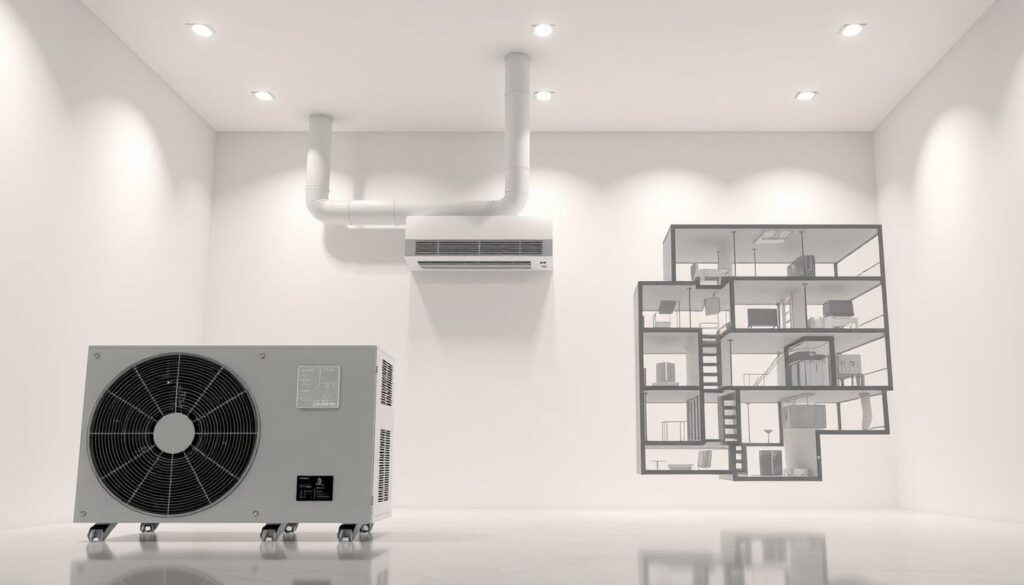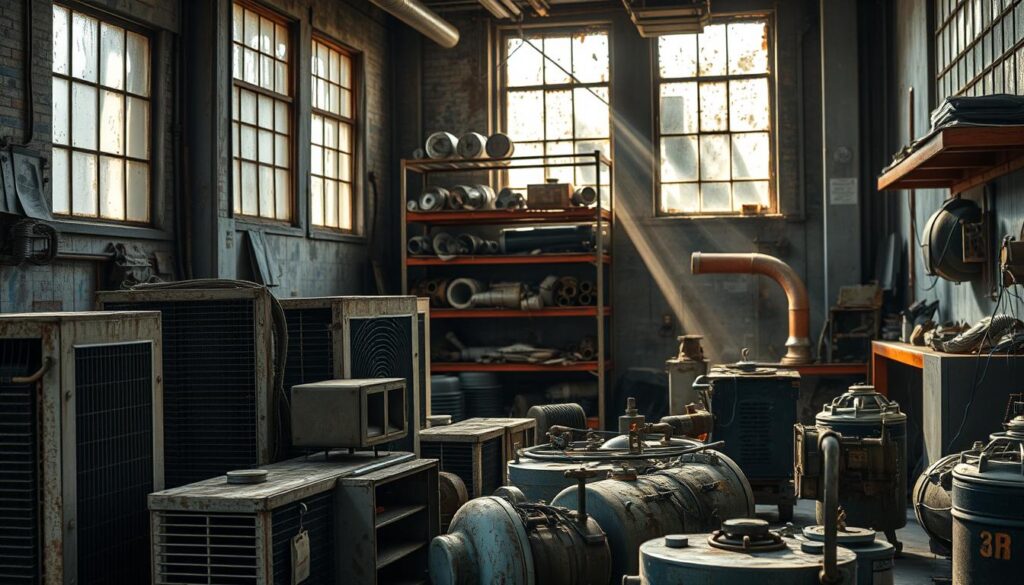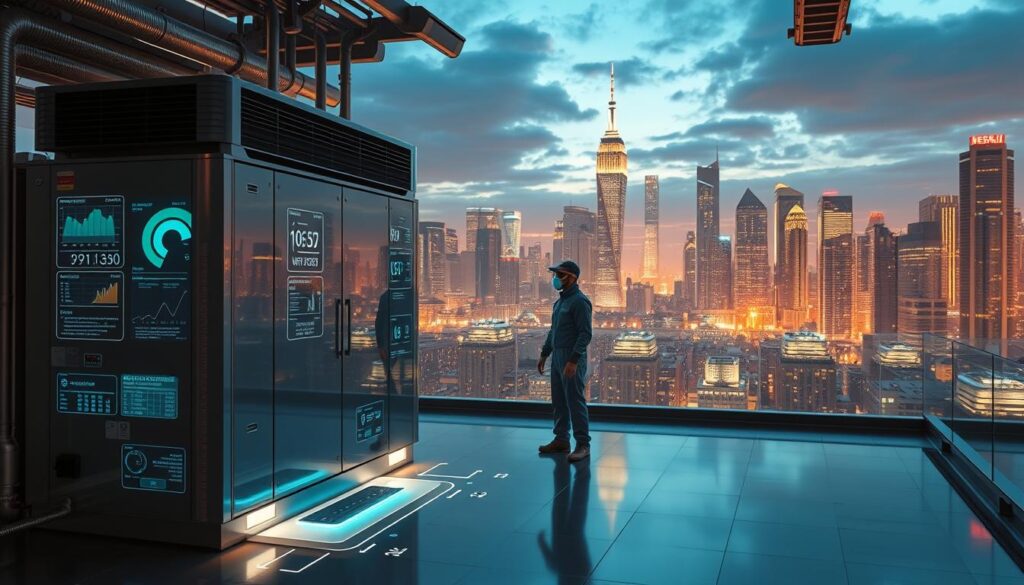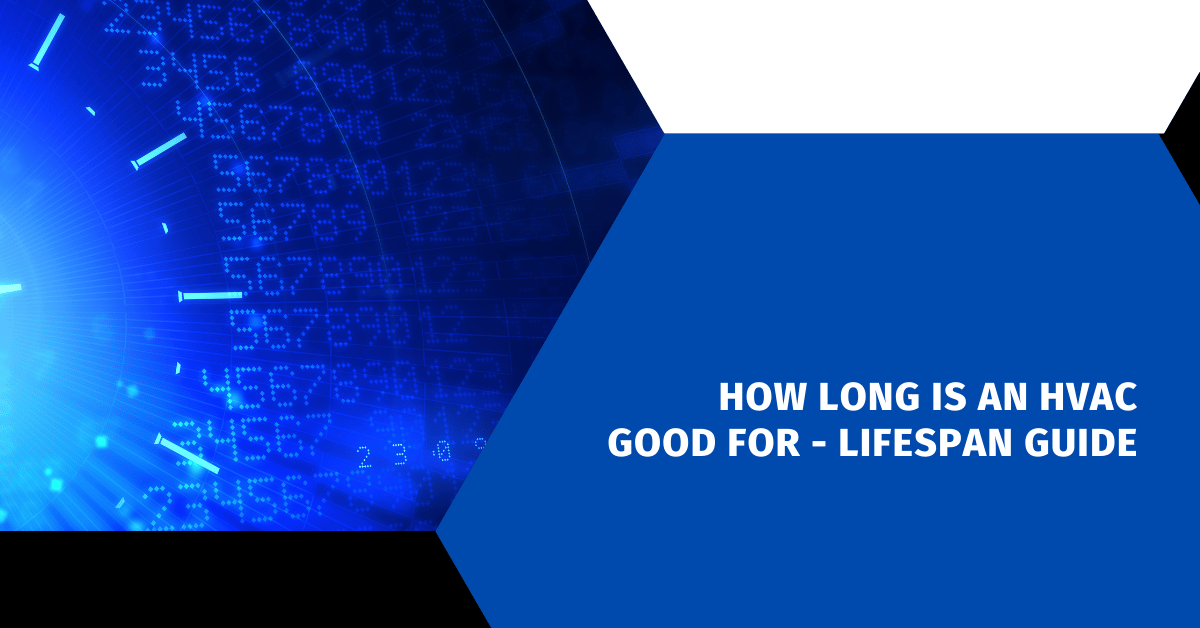Affiliate Disclosure
HVAC Guide Guys is a participant in the Amazon Services LLC Associates Program, an affiliate advertising program designed to provide a means for sites to earn advertising fees by advertising and linking to Amazon.
How Long Is An HVAC Good For? Ever thought about how long your home’s HVAC system will last before needing a full replacement? Knowing your heating and cooling system’s lifespan can save you a lot of money on repairs and replacements.

Your HVAC system is a big investment. It usually lasts between 10 to 25 years. How long it lasts depends on many things, like how well you maintain it, how often you use it, and the environment around it.
This guide will help you understand how long your HVAC system will last. We’ll talk about how long it can last, how to keep it running well, and when it’s time to get a new one.
Key Takeaways
- Typical HVAC system lifespan ranges from 10 to 25 years
- Regular maintenance can significantly extend system durability
- Different HVAC components have varying life expectancies
- Environmental factors impact overall system performance
- Energy efficiency plays a critical role in system longevity
Table of Contents
Understanding HVAC System Lifespans
Your HVAC system is key to your home’s comfort and energy use. Knowing how long it lasts can help you decide when to maintain or replace it. The lifespan of HVAC systems varies based on several factors.
It’s important to know that each HVAC system type lasts differently. HVAC systems can last from 10 to 30 years. This range changes based on the system type and how well it’s maintained.
Average Lifespan by System Type
- Central Air Conditioning Units: 12-17 years
- Heat Pumps: 10-16 years
- Furnaces and Boilers: 15-20 years
- Geothermal Heat Pumps: 25-30 years
- Solar HVAC Systems: 25-30 years
Factors Affecting HVAC Longevity
Several factors can affect how long your system lasts:
- Maintenance Quality: Regular checks by pros can make it last longer
- Usage Patterns: How often and hard you use it matters
- Installation Expertise: A pro install means better performance
- Equipment Quality: Better units usually last longer
Climate Impact on System Duration
Your local weather affects how long your HVAC system lasts. Extreme weather, like very hot or cold temperatures, can wear it down faster. Places with lots of salt in the air or big temperature changes might see their systems not last as long.
Proactive maintenance is key to maximizing your HVAC system’s performance and longevity.
Explore Our HVAC Shop
Looking for top-rated HVAC tools, parts, and accessories? Visit our shop and find the perfect solution for your needs.
Visit the ShopHow Long Is An HVAC Good For: A Comprehensive Timeline
Knowing how long your HVAC system will last is key to keeping your home comfy and energy-efficient. Most systems last between 15 to 25 years. But, this can change a lot based on different factors.
When you might need a new HVAC depends on a few important things:
- What kind of system you have and how well it was installed
- How often you get it checked by pros
- The weather in your area
- How much you use it
Each part of your HVAC system has its own lifespan:
- Gas furnaces: 20 to 30 years with good care
- Air conditioners: 15 to 20 years
- Heat pumps: 10 to 20 years
- Boilers: 20 to 35 years
“Proactive maintenance can make your HVAC system last longer and work better,” say experts.
Places near the coast can make systems last much less. In areas with lots of salt, systems might only last 7 to 12 years. This is because of faster corrosion and environmental stress.
Planning for your HVAC system’s life means regular checks, fixing things quickly, and knowing when it’s cheaper to replace than keep fixing.
Common HVAC Components and Their Durability
Knowing how long different HVAC parts last is key for homeowners. It helps keep your home comfy and saves energy. Each part is vital for good indoor temperatures and energy use.
Most HVAC systems last 16-20 years with good care. Let’s look at how long specific parts last:
Furnace Lifespans
Gas furnaces can last 15 to 30 years. Electric ones usually last 10 to 20 years. How long they last depends on:
- How well they were installed
- How often they’re checked
- How much they’re used
- The local weather
Air Conditioner Performance
Central air conditioners usually last 15 to 20 years. But, near the coast, they might only last 10-15 years. This is because of salt air and humidity.
Heat Pump Considerations
Heat pumps can heat and cool your home. They last about 15 to 20 years. Their life depends on:
- How often they’re checked
- How well they were installed
- The weather they face
“Proactive maintenance is the secret to extending your HVAC system’s life beyond expected timelines.” – HVAC Maintenance Experts
Only 15% of homeowners think their systems will last 21-25 years. 8% believe they’ll last 26 years or more. Regular checks by pros can help you get the most out of your system.
Explore Our HVAC Shop
Looking for top-rated HVAC tools, parts, and accessories? Visit our shop and find the perfect solution for your needs.
Visit the ShopKey Signs Your HVAC System Needs Replacement
Spotting hvac replacement signs early can prevent sudden breakdowns and expensive fixes. Your HVAC system shows signs of wear through several key indicators. It’s important not to overlook these signals.
Homeowners should watch for these warning signs that your HVAC system might be nearing the end:
- Age of the system (15-20 years old)
- Increasing frequency of repairs
- Rising energy bills
- Inconsistent temperature control
- Unusual noises or strange odors
When repair costs near 50% of a new system’s price, it’s wise to replace it. The average repair cost ranges from $150 to $500 per incident. This can quickly lead to big expenses.
| System Age | Replacement Likelihood | Recommended Action |
|---|---|---|
| 0-10 years | Low | Routine maintenance |
| 10-15 years | Moderate | Consider efficiency evaluation |
| 15-20 years | High | Strong replacement recommendation |
Look out for more hvac replacement signs like constant humidity, uneven heating or cooling, and more dust or poor indoor air. These signs show your system might not be working well.
Getting a new HVAC system can bring many benefits. You’ll see better energy efficiency, lower bills, and more comfort at home. Don’t wait until your system fails completely before acting.
Explore Our HVAC Shop
Looking for top-rated HVAC tools, parts, and accessories? Visit our shop and find the perfect solution for your needs.
Visit the ShopImpact of Maintenance on HVAC Lifespan
Your HVAC system is a big investment that needs regular care. A good hvac maintenance schedule can make your heating and cooling last longer. This can save you a lot of money on new systems.
Regular maintenance does more than just prevent breakdowns. It also makes your system work better and last longer. Homeowners who stick to a maintenance plan see big benefits.
Creating Your Maintenance Timeline
A good hvac maintenance schedule includes both seasonal and yearly tasks:
- Monthly: Check and replace air filters
- Quarterly: Inspect outdoor units and clean around them
- Biannually: Get a professional to tune up your system
- Annually: Do a deep clean and check your system thoroughly
Professional vs DIY Maintenance
Some maintenance tasks you can do yourself, but professionals bring special skills. Here’s how they compare:
| DIY Maintenance | Professional Maintenance |
|---|---|
| Change filters | Check your system’s health fully |
| Do simple checks | Get a detailed report on how well your system is working |
| It’s cheap | It can save you from expensive repairs later |
Filter Replacement Guidelines
Keeping your filters clean is key to your hvac maintenance. Clean filters can make your system up to 15% more efficient. Change them every 1-3 months, depending on your home’s conditions.
Regular maintenance can make your HVAC system last up to 30% longer and cut energy costs a lot.
Environmental Factors Affecting HVAC Durability

Your HVAC system’s life can be greatly affected by its surroundings. Places near the coast, areas with lots of humidity, and places with very hot or cold temperatures are tough on HVAC systems.
Environmental conditions can affect HVAC durability in several ways:
- Coastal areas cause faster corrosion from salt
- Places with lots of humidity can lead to moisture damage
- Big changes in temperature can stress system parts
Living near the coast can cut your HVAC system’s life in half compared to inland areas. It’s important to take steps to protect your HVAC in these tough environments.
“Environmental protection is not just about the planet, but also about protecting your HVAC investment.” – HVAC Industry Expert
To keep your HVAC system running well, consider these steps:
- Put protective covers on outdoor units
- Get professional maintenance more often
- Choose parts that won’t corrode easily
| Environment Type | HVAC Durability Impact | Recommended Protection |
|---|---|---|
| Coastal | High Corrosion Risk | Protective Covers, Frequent Cleaning |
| High Humidity | Moisture Damage Possible | Dehumidifiers, Regular Checks |
| Extreme Temperatures | Stress on Components | Advanced Insulation, Professional Adjustments |
Knowing about these environmental challenges helps you make smart choices to protect and maintain your HVAC system. This way, it will work better and last longer.
Explore Our HVAC Shop
Looking for top-rated HVAC tools, parts, and accessories? Visit our shop and find the perfect solution for your needs.
Visit the ShopCost Considerations for HVAC Replacement
Getting a new HVAC system is a big decision. It affects your home’s comfort and your wallet. Knowing the costs helps you choose wisely.
Energy Efficiency Benefits
Today’s HVAC systems use less energy. They can cut your monthly bills by a lot. This makes them a smart choice for saving money over time.
- New systems can save up to 30% on energy
- Look for SEER ratings of 20 or higher
- You could save $300 to $800 a year
Return on Investment Timeline
Figuring out the cost of a new HVAC system takes some thought. The upfront cost is high, but the long-term savings are worth it.
| HVAC System Type | Average Replacement Cost | Estimated Annual Savings | Payback Period |
|---|---|---|---|
| Central Air Conditioning | $9,900 | $450 | 22 years |
| Heat Pump System | $11,000 | $600 | 18 years |
Important financial points to think about include:
- Initial installation costs
- Energy savings
- Tax credits and rebates
- Long-term performance
Pro tip: Many utility companies offer incentives for upgrading to energy-efficient HVAC systems, which can help offset initial replacement costs.
When looking at hvac efficiency over time, remember. A good choice can save you a lot of money. Your investment today will pay off in comfort and savings for years to come.
Explore Our HVAC Shop
Looking for top-rated HVAC tools, parts, and accessories? Visit our shop and find the perfect solution for your needs.
Visit the ShopModern HVAC Technologies and Lifespan Improvements

The HVAC industry has seen big changes, making systems last longer and work better. New technologies are changing how heating and cooling systems work. They make systems last longer and use less energy.
New innovations are changing how long HVAC systems last. They use advanced technology:
- Variable-speed compressors that reduce mechanical stress
- Smart thermostats enabling precise temperature control
- IoT-integrated monitoring systems
- Eco-friendly refrigerant technologies
Heat pump technology is a big step forward in HVAC efficiency. Electric air-source heat pumps can reduce heat-based energy consumption by up to 50% compared to old systems. These new units work better and last longer.
Smart technology lets you check your system anytime. It finds problems early. Sensors and smart algorithms watch how your system is doing. They tell you when you need maintenance and prevent sudden failures.
New HVAC systems meet SEER2 standards, which mean they’re more efficient. This means your system works better and lasts longer. It also saves you money on energy.
Investing in modern HVAC technology isn’t just about immediate comfort—it’s a long-term strategy for energy efficiency and system longevity.
By using these new technologies, you get better HVAC systems. They use less energy and keep your home comfortable for longer.
Conclusion
Knowing how long your HVAC system lasts is key to a cozy and efficient home. Most systems last 15-20 years. Planning ahead is important.
Keeping up with maintenance is vital. Change filters every 1-3 months and get annual checks. This can stop 75% of repairs. Regular care also saves up to 30% on energy bills.
New HVAC tech is more energy-efficient, saving 20-30% over old systems. When it’s time to replace, think about age and performance. Upgrading improves comfort and boosts your home’s value and energy use.
Your HVAC system is essential for your home’s comfort. By knowing its lifespan, maintaining it well, and making smart upgrades, you’ll enjoy years of comfort, efficiency, and savings.

